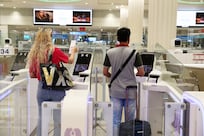Emirates is unhappy with the long delays to Boeing's 777X wide-body programme and expects the US plane maker's new management to fix the issues, the airline's chief executive has said.
The airline has received assurances from Boeing that it will address the issue, Sheikh Ahmed bin Saeed, chairman and chief executive of Emirates airline and Group, told reporters during the Arabian Travel Market in Dubai on Tuesday.
"I am not happy. I hope that the new management today will put all the effort to fix the delivery of Boeing's 777X. I met with the management some time ago and they promised to do their best to fix it," he said.
Uncertainty over the delivery date of the 777X jets is "putting a lot of pressure" on the airline's seat capacity and resulted in its multibillion-dollar retrofit programme to upgrade the interiors of older aircraft to keep them in service for longer, he said.
The certification of Boeing's 777X aircraft is now expected to take place in the first quarter of 2025, he said.
Emirates is the largest customer of Boeing's 777X, which will be the aviation industry's biggest twin-engine jet when it enters into service. The plane has been delayed by about five years due to problems including certification hold-ups.
At the Dubai Airshow in November, Emirates signed a deal for firm orders for 55 additional Boeing 777-9s and 35 Boeing 777-8s. This took the airline’s 777X order book to a total of 205 jets.
Out of its previous order of 115 Boeing 777Xs, the first 777-9 is expected to join Emirates’ fleet in 2025.
On Tuesday, Emirates said it will completely refurbish an additional 43 Airbus A380s and 28 Boeing 777 aircraft, expanding its retrofit programme to 191 jets.
The initial plan had called for 120 planes – 67 Airbus A380s and 53 Boeing 777s – to undergo full refurbishment.
The airline is topping up its multibillion-dollar investment in the retrofit programme to prolong the lifetime of its older twin-aisle aircraft amid long delays to the 777X programme.
Emirates' move to DWC
Emirates is expected to move its operations to the new passenger terminal at Al Maktoum International Airport (DWC) in 2034 and "it will be in one go", Sheikh Ahmed said on Tuesday.
Emirates, the world's largest airline by international traffic, has a fleet of 260 planes and carried 43.6 million passengers in its last fiscal year, making the move a major undertaking.
"I think you will wake up one day and see the terminal is open, it is tested and you will see your Emirates flight from Al Maktoum [airport]," he said.
Last month, Dubai said it approved designs for a new passenger terminal at Al Maktoum International and began construction at a cost of Dh128 billion ($34.8 billion).
Sheikh Ahmed said he was "not worried" about the financing for the mega-project.
Dubai's new airport terminal will meet growth demands, Sheikh Ahmed bin Saeed says

"A lot of companies, locally and internationally, will be very keen on financing this project, from [the] baggage-handling system to parking to the terminal [building]," he said.
The latest announcement of the new terminal comes after Dubai had set out an earlier plan in 2014 for a $33 billion expansion of DWC in phases.
However, Sheikh Ahmed said he was confident the new terminal project will proceed as scheduled, as domestic airlines Emirates and Flydubai require an airport with a larger capacity to accommodate their future growth plans and large aircraft deliveries.
"We are confident that without this airport, Dubai will be going backward ... having all those aircraft coming to the fleet, they are signed orders, [means] I need gates and parking," he said.
In a separate panel on Tuesday at the Arabian Travel Market, Paul Griffiths, the chief executive of Dubai Airports, said the industry's shift towards smaller planes would change the aviation landscape significantly. Middle Eastern airports that previously could not sustain long-haul services will be connected directly to major hubs such as Dubai, he said.
This will lead to an increase in the number of destinations served by Dubai, potentially exceeding 300 cities, he said.
“The majority of the growth is going to be [in] single-aisle smaller aeroplanes because the engine and airframe technology has moved on so much that the economics of those aircraft are a bit better than the economics of their larger cousins,” Mr Griffiths said.
“What it means is that regional airports that haven't sustained long-haul service will now be connected directly to major hubs like Dubai. So you'll see a plethora of destinations. I think we'll probably get to over 300 cities that are served directly.”






